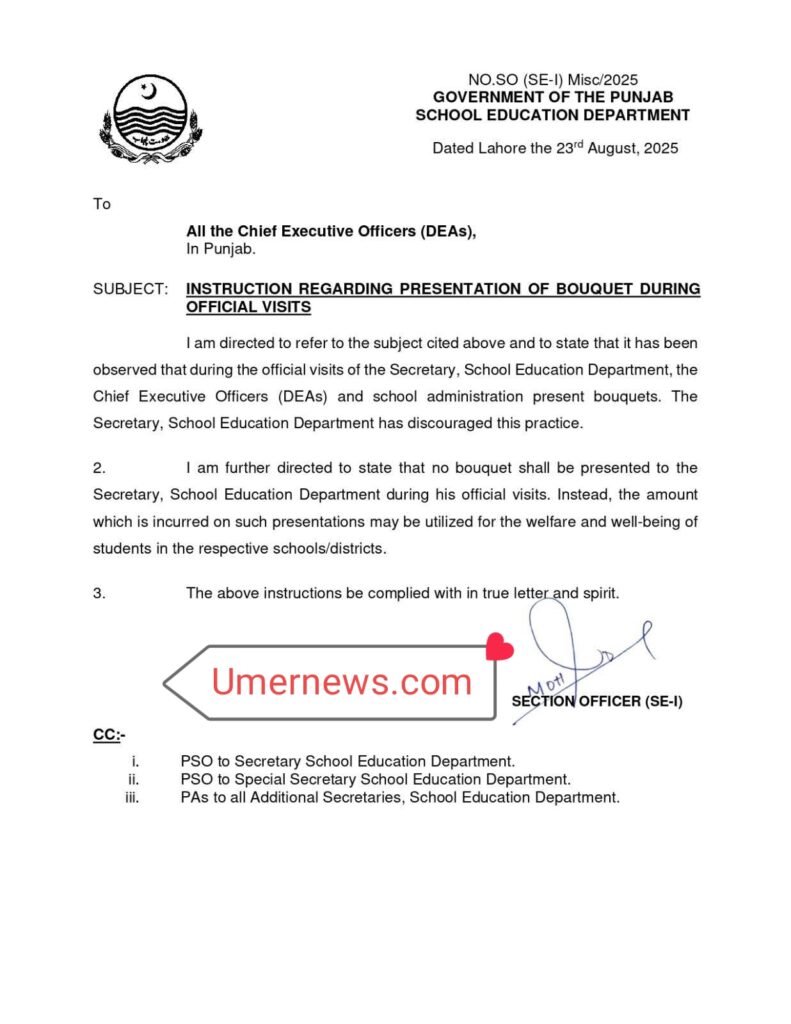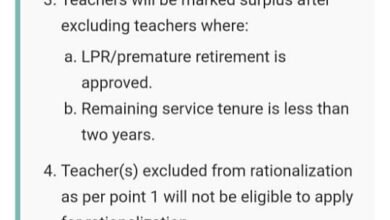Stop Presenting Bouquets
Contents
Stop Presenting Bouquets: Why the Punjab Education Department’s New Policy is a Game Changer

Meta Description: The Punjab School Education Department has banned bouquets during official visits. Learn why this new policy is a significant step forward for the welfare of students.
Introduction
A new policy from the Punjab School Education Department is making headlines, and for good reason. The department has officially instructed all Chief Executive Officers (DEAs) to stop presenting bouquets during official visits by the Secretary, School Education Department. This might seem like a small change, but it’s a powerful one with big implications. Instead of spending money on flowers that wilt and fade, the department is directing those funds toward the welfare and well-being of students in schools and districts across Punjab. This is a game-changer for educational resource allocation and highlights a shift towards more practical, student-focused initiatives.
The New Directive: From Flowers to Funds
The official notice, dated August 23, 2025, clearly states that the practice of presenting bouquets has been discouraged. The document, signed by a Section Officer (SE-I), leaves no room for ambiguity. The core message is straightforward: any amount that would have been spent on bouquets must now be utilized for the welfare and well-being of students.
This move marks a significant shift in thinking. Rather than focusing on symbolic gestures, the department is prioritizing tangible benefits for the students they serve. This is a welcome change for many who have long argued that valuable resources should be allocated directly to those who need them most—the students.
Why This Policy is a Positive Change
The decision to stop presenting bouquets is more than just a cost-cutting measure; it’s a philosophical shift. Here’s why this new policy is so beneficial:
- Financial Impact: While a single bouquet may not be expensive, the cumulative cost of these gestures across hundreds of official visits adds up. Re-routing these funds, even in small amounts, can have a noticeable impact on a school’s budget.
- Prioritizing Student Welfare: The policy directly ties the savings to student welfare. This means the money can be used for things like purchasing new books, repairing classroom equipment, or funding extracurricular activities.
- Setting a New Precedent: This instruction sets a powerful precedent for other government departments and private organizations to re-evaluate their own spending habits. It promotes a culture of practical investment over ceremonial display.
Practical Applications of the New Funds
So, what exactly does “welfare and well-being of students” mean in practice? The funds re-allocated from the purchase of flowers could be used in numerous ways to directly benefit students:
- Classroom Supplies: Purchasing new textbooks, notebooks, or stationery for students who can’t afford them.
- Infrastructure Improvements: Small repairs to a classroom, improving sanitation facilities, or installing a water cooler.
- Extracurricular Activities: Funding for sports equipment, art supplies, or science fair projects.
- Student Support: Providing a meal for a needy student or covering the cost of a medical check-up.
This directive empowers school administrators to make a real, on-the-ground difference with funds that would otherwise be wasted.
Frequently Asked Questions
Q1: What is the main purpose of the new policy?
The main purpose is to redirect money that was previously spent on symbolic gestures, like presenting bouquets, towards the practical welfare and well-being of students within schools and districts in Punjab.
Q2: Who is affected by this instruction?
This instruction is directed to all Chief Executive Officers (DEAs) and school administrations in Punjab. It affects anyone involved in official visits by the Secretary, School Education Department.
Q3: How much money will this policy save?
The exact amount is not specified, but the cumulative savings from no longer purchasing bouquets for official visits will be directed to student-focused initiatives. Even small savings can make a big difference when applied across many schools.
Q4: Does this apply to all official visits?
The document specifically mentions official visits by the Secretary, School Education Department. However, its principle is likely to be adopted for other official visits as well, promoting a more efficient use of resources.
Q5: Is this policy permanent?
Yes, the instructions are to be “complied with in true letter and spirit,” indicating that this is a standing policy change, not a temporary measure.
Q6: What is the official date of the document?
The official document is dated the 23rd of August, 2025.
Q7: Who issued the directive?
The directive was issued by the Government of the Punjab School Education Department, and the document is signed by a Section Officer (SE-I).
Conclusion
The directive to stop presenting bouquets is a small but powerful example of a government body prioritizing its mission over outdated formalities. The Punjab School Education Department is leading the way by ensuring that every rupee spent is for the benefit of the students it serves. This is an admirable and practical step that puts the focus back where it belongs: on education and the future generation.
What do you think about this new policy? Share your thoughts in the comments below!








